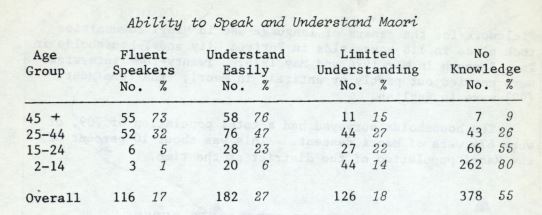-
Ngā Karere me Ngā Rauemi
News and Resources
Ngā Karere me Ngā Rauemi
News and Resources
-
Te Rangaihi Reo Māori
The Movement
Te Rangaihi Reo Māori
The Movement
-
Te Pae Kōrero
Our Community
Te Pae Kōrero
Our Community
-
Huihuinga
Events
Huihuinga
Events
-
Ngā Ara Ako
Learning Pathways
Ngā Ara Ako
Learning Pathways
-
SearchSearch
Search
Search

Many parents regretted that they couldn't speak the language better in order to teach it to their own children, and there was, therefore, much support for the teaching of Maori in schools, especially at the infant level. Elders of the original inhabitants of the area - the Ngati Toa - were particularly concerned at the loss of the language among younger generations and were trying to restore the language through tribal wananga on local marae. Some fluent speakers of Maori, from tribal areas outside of Porirua, shared these difficulties in holding on to their language in the urban area where the everyday language of business, newspapers, radio and TV was English. Many of these people, fortunately, were able to take part in Māori language and cultural activities aimed mainly at members of their tribal group now living in this new environment.
Te Whanganui-a-Tara | Wellington | Porirua City | 1970-79 | 5% of Māori children can speak te reo. (1970-75) | Story is by tangata whenua
















Comments